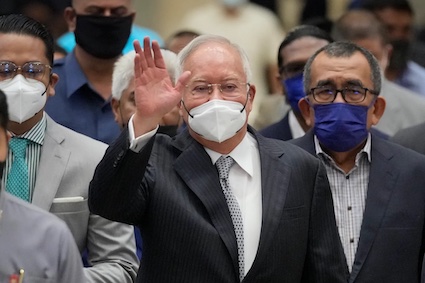A Leader Less Umno

While many celebrate the jailing of Najib Razak, the 1st former Malaysian prime minister to be imprisoned, as proof of judiciary independence and long-awaited justice, not everyone’s happy. Political analyst Dr BRIDGET WELSH looks at how Umno continues to support its convicted former leader and how the court decision affects internal power struggles.
DR BRIDGET WELSH, Between the Lines
For the world, the imprisonment of former prime minister Najib Razak through a meticulous and thorough legal process reflects Malaysia’s strength. Very few countries put away leaders for their crimes.
For the Umno world, however, the imprisonment of its political godfather and the emotive rally response to his imprisonment reflects the party’s weaknesses. It underlines the fact that too few are willing to put aside Najib for the sake of their country.
From Malays to Martyr
Umno was once a party that derived its legitimacy from strengthening Malaysia and empowering its political base among the Malay community. One can debate and question its effectiveness in doing this, but one cannot dismiss the party’s many accomplishments in government since its first prime minister Tunku Abdul Rahman declared “Merdeka” and assumed office 65 years ago.
Today, however, Malaysia’s “Grand Old Party” is just old and no longer as grand. And a leader it lauded and protected after the world’s largest kleptocracy scandal of 1MDB was revealed in 2015 is behind bars.
Rather than opt to move on, the current party leadership has decided to make Najib a martyr. His “sacrifice” is now being used to rally the party faithful, with little regard of the costs of feeding the myth about injustice and building a narrative that erodes confidence in Malaysia’s political institutions, especially the judiciary.
Instead of representing all Malays, Umno is now deriving its legitimacy from its efforts to protect one Malay (and his cronies). This is the cost of letting Najib maintain his position and influence in the party after the events of 2015.
Rooted in the first Dr Mahathir Mohamad era, a precedent was set in which the party became synonymous with its leader. Umno has yet to give up this practice, with its leaders consistently holding the party hostage to their personal interests. Current president Ahmad Zahid Hamidi appears to be doing the same thing, hoping that the party will provide him with the same level of personal protection it did Najib and that the martyring of his predecessor will allow Zahid to eventually become prime minister.
Umno dystopia
The Umno world is its own world. Too many in the party continue to live in a self-absorbed universe where they believe they control Malaysian politics, that they control the date of a general election, that their leaders are above the law, that they are entitled to power and the largesse of controlling the levers of power.
There is little appreciation that this is now an imagined fantasy. Umno’s “not so special meeting” last week served to illustrate how far the party is from current reality. And in one short day, it eroded over four years of effort to win over the middle ground of public support. It also reinforced perceptions that Umno is about itself, and triggered older reactions like “anything but Umno (ABU)”.
Essentially, it opted to consolidate its party faithful, not properly recognising that its core political base is much narrower than in the past, and lost yet another opportunity to move on.
One can posit that emotions coloured the response of members. Many in Umno were truly shocked that one of its own, its leader, could be jailed. Many remain so. Yet, this speaks to a different-yet-similar-sounding phenomenon: syiok sendiri.
All OK on the outside
Malaysia is no longer living in an Umno world. While still important, as Umno represents at least a third of the Malays in the country and is among the parties with the largest number of seats in Parliament, what happens in the party doesn’t have the same impact as before. Indeed, after their own reactions to the verdict, Malaysians went about their business.
Unlike in 1998, when public sympathy built among the middle ground after the imprisonment of current opposition leader Anwar Ibrahim, this time around, there’s been little momentum of sympathy beyond the hardcore of the party. If there was a dominant reaction this week among the middle ground, it was contempt of the efforts to promote sympathy, the ridiculing of letters from “daddy” and the privilege that was on display.

